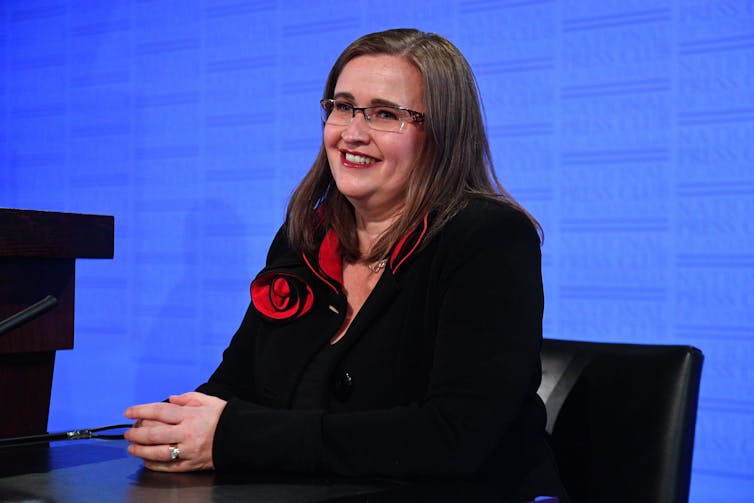The government's 'roadmap' for dealing with sexual harassment falls short. What we need is radical change
- Written by Emma Golledge, Director, Kingsford Legal Centre; Senior Lecturer, UNSW Law, UNSW
Over a year ago, Kate Jenkins, the Sex Discrimination Commissioner, publicly released the Respect@Work report[1], a landmark national inquiry into sexual harassment in workplaces by the Australian Human Rights Commission.
Jenkins found the prevalence of sexual harassment in Australia to be “endemic”, conservatively estimating the cost to the economy at $3.5 billion dollars per year. The report also documented the long-term health and well-being implications for people (predominantly women) who experience such harassment, and made 55 recommendations to comprehensively reform how Australia responds to and prevents sexual harassment.
Fast forward a year and there has been no meaningful reform, despite a groundswell of public concern and increasing numbers of women speaking out about the sexual harassment they have experienced at their workplaces.
On March 15, as part of the March 4 Justice[2], a petition of more than 90,000 signatures[3] was delivered to Canberra politicians. A key demand was that the government fully implement the 55 recommendations in the Respect@Work Report.
 Protesters at the March 4 Justice rallies were demanding gender equality and an end to gendered violence and sexual harassment.
James Ross/AAP
Protesters at the March 4 Justice rallies were demanding gender equality and an end to gendered violence and sexual harassment.
James Ross/AAP
Light on detail: the government’s response
Following intense public pressure, the Morrison government has finally responded to the report with a plan entitled, “A Roadmap for Respect: Preventing and Addressing Sexual Harassment in Australian Workplaces[4]”.
The roadmap recognises the importance of a preventative approach to stop sexual harassment before it occurs. It also expresses agreement (either in full, in part or in principle) or “notes” the recommendations in the Respect@Work report.
Read more: Friday essay: Sex, power and anger — a history of feminist protests in Australia[5]
This, however, falls significantly short of a commitment to fully implement all 55 recommendations put forth by Jenkins. For the roadmap to respond effectively to her damning findings, it must deliver radical change to ensure workplace equality in reality.
That said, there is no doubt the groundswell of public condemnation of sexual harassment has meaningfully shaped the government’s response.
Positive measures announced include:
extending the time limit for making a sexual harassment complaint to the Australian Human Rights Commission from six months to 24 months
clarifying that sexual harassment is a form of serious misconduct that can warrant immediate dismissal
closing the loophole that exempts parliamentarians and judges from being held accountable for sexual harassment complaints under the Sex Discrimination Act.
All these changes are welcome and, in fact, long overdue. Other aspects of the roadmap will require scrutiny, as further details emerge.
 Kate Jenkins handed her report to the Morrison government over 14 months ago.
Mick Tsikas/AAP
Kate Jenkins handed her report to the Morrison government over 14 months ago.
Mick Tsikas/AAP
A key hope was the government would strengthen the legal obligations on employers to prevent sexual harassment — known as “positive obligations[6]”. However, the roadmap indicates the government believes this duty already exists in work health and safety laws.
Given Jenkins’ finding of “endemic” sexual harassment in Australian workplaces, this approach has clearly not worked. Furthermore, work health and safety laws are complex and unlikely to be an entirely appropriate approach for dealing with sexual harassment matters.
We should remain mindful of the needs of people who have experienced this type of harassment to have a voice in the process, to tell their story and to receive a just outcome. Given the size of the challenge ahead of us, we should look to strengthen the Sex Discrimination Act with a positive duty on employers to prevent this type of behaviour.
Read more: Sexual harassment at work isn't just discrimination. It needs to be treated as a health and safety issue[7]
This would help create the cultural change Australia needs and bring greater scrutiny of workplaces with significant sexual harassment problems. It would also give important oversight to the AHRC as the expert body.
We also need to watch and ensure the recommendations are followed with increased budgetary support at all ends of the spectrum. This includes everything from the important preventative education work with young people that Jenkins found works, to strengthening the supports available to people who need help when they experience sexual harassment.
The AHRC should be properly empowered to take on the mammoth task of seeing this challenge through to the end.
Further work to be done
There is no doubt that without the bravery of the people who have brought complaints of sexual harassment (usually at a high personal cost), or who spoke to Jenkins or spoke out publicly in recent months, we would not have seen such a recognition by the government about the scale and size of the problem.
In order to fully transform the way in which Australia deals with sexual harassment, the government must consider greater reform in terms of the role confidentiality agreements have in legally silencing people who bring sexual harassment complaints.
People brave enough to bring formal legal complaints of harassment are most often asked to sign a confidentiality agreement in settlement of their cases. These agreements usually prevent them from speaking about what they experienced and can mean serial sexual harassment continues unabated.
They also reflect the power imbalance in sexual harassment cases, with harassers or employers almost always insisting on confidentiality. This means we don’t know which workplaces have sexual harassment problems.
Read more: Politicians need expert help to change culture of sexual violence and impunity. We don't need yet another review to tell us that[8]
Australia should consider following a growing number of US jurisdictions[9] in introducing legislation that only permits confidentiality clauses in sexual harassment settlements when requested by the person who has experienced the harassment.
We need to use the power of the law to change this legally sanctioned silence. This is a powerful way we can work to end the culture of silence and shame around sexual harassment, so anyone who experiences it can feel supported and empowered enough to call it out, whoever the harasser is.
We need to remember Jenkins found that sexual harassment was not inevitable — and was preventable. The way we respond now will determine whether this remains a widespread experience into the future.
References
- ^ Respect@Work report (humanrights.gov.au)
- ^ March 4 Justice (www.march4justice.com.au)
- ^ 90,000 signatures (www.bbc.com)
- ^ A Roadmap for Respect: Preventing and Addressing Sexual Harassment in Australian Workplaces (www.ag.gov.au)
- ^ Friday essay: Sex, power and anger — a history of feminist protests in Australia (theconversation.com)
- ^ positive obligations (www.klc.unsw.edu.au)
- ^ Sexual harassment at work isn't just discrimination. It needs to be treated as a health and safety issue (theconversation.com)
- ^ Politicians need expert help to change culture of sexual violence and impunity. We don't need yet another review to tell us that (theconversation.com)
- ^ a growing number of US jurisdictions (nwlc-ciw49tixgw5lbab.stackpathdns.com)

















